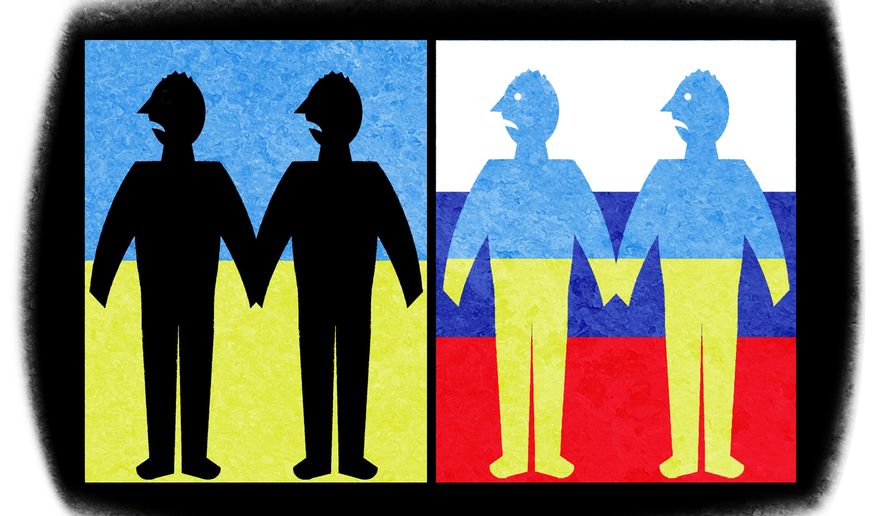OPINION:
Vladislav Orani, 18, and his brother Andrii, 30, were riding their bikes home to Bucha after visiting their sister in a nearby village. This was about a month after the Russians had invaded their hometown. On their route home, they encountered a Russian checkpoint, where Russian soldiers demanded to see their papers. This innocuous interaction ended with both men being beaten and taken prisoner by the Russians to be used for prisoner exchanges.
The Russian invaders habitually abuse their power in interactions with Ukrainian citizens and have made a practice of capturing random citizens to use as leverage in prisoner exchanges.
This is just one instance of the human rights violations and compromised ethics that underlie the entire Russian invasion and their war tactics. Since the invasion, some Russian soldiers have been tried for war crimes in Ukraine, but imprisoning the soldiers doesn’t get to the root of this problem. Russian military and political leaders are calling the shots and have been encouraging aggression and intimidation all the while. Prosecuting these soldiers is a start, but we shouldn’t stop there. Vladimir Putin and the leaders who have facilitated these atrocities must be held accountable for their crimes against the Ukrainian people.
The Orani brothers’ experience demonstrates just how arbitrary and evil Russian tactics can be. Expecting to be stopped for papers, the two had the necessary documents with them so that they could make it home without issue. After the Russians reviewed their papers, however, they did something the brothers had not expected.
“Show us your smartphones!” the soldiers at the checkpoint demanded.
“We don’t have phones,” they answered. “We have nothing to give you.”
At this point, the soldiers grew angry and began accusing the men of hiding their phones before they reached the checkpoint. “We know what you’ve done,” the soldiers said angrily. “We see through you.”
The brothers were now scared — they really didn’t have smartphones.
“You threw away your phones because you’re spies,” the soldiers declared. Before they could even deny this ludicrous claim, the soldiers tied them up, put bags over their heads, and shoved them into an armored personnel carrier.
I heard this story from the younger Orani brother in December when I was invited to visit Bucha as a special guest of the Ukrainian Regional Police. I met him and his mother at a police station outside of Kyiv.
“They beat us,” he said flatly. “They struck our ribs and bodies with batons for at least half an hour. Then they drove us to the Belarus border.”
In Belarus, things got slightly better for Vladislav — perhaps because he was under 18 at the time. “They took me to a dorm where there were other Ukrainian refugees. We stayed for four or five days, not leaving our beds except to go to the dining room,” he explained. “After that, they took me to an orphanage in Belarus. I turned 18 there.”
On April 22, nearly six weeks after he and his brother’s unjustified arrest, Vladislav Orani was released as part of a prisoner exchange. It was the first time his mother knew what had happened to him.
Here, Mrs. Orani stepped in. She told me that Vladislav’s release was bittersweet because she still had no information regarding her son Andrii’s whereabouts. He is not listed on any prison records. In addition, after the two brothers were captured, her son-in-law was also caught up in a Russian sweep. He, too, remains missing. Meanwhile, her daughter has given birth.
Her only hope is that her son and son-in-law will be exchanged for Russian prisoners. But even that hope is tinged with anguish,
“As soon as they make the exchange,” she said, “the Russian soldiers will be back killing Ukrainians again.”
As of mid-December, this practice of kidnapping Ukrainians to exchange for Russian prisoners of war had resulted in at least 20,000 prisoner swaps. That means at least as many Ukrainians have been kidnapped — and many of those tens of thousands of Russians went back to the front lines.
Many of us know that the Russians are using unethical means to try to force their way to victory. Still, we must acknowledge the elephant in the room: The Kremlin, with Mr. Putin at the top, bears direct responsibility for these crimes.
As the international community continues to support Ukraine and condemn Russia’s invasion, we must not minimize their leadership’s role simply because they aren’t the ones drafted to the front lines. Mr. Putin has created a culture that condones his army’s unethical actions. To adequately hold Russia accountable for its war crimes, we need to investigate and try individuals of all ranks and ensure that Russia’s political and military leaders are unable to ever lead their army to commit such atrocities again.
• Harvard graduate Mitzi Perdue is a writer, speaker, and author of the award-winning biography “Relentless,” the story of Mark Victor Hansen, the “Chicken Soup for the Soul” co-author. All royalties for this book will go to supporting humanitarian relief for Ukraine.




Please read our comment policy before commenting.